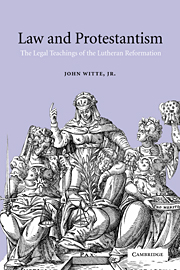Book contents
- Frontmatter
- Contents
- List of illustrations
- Foreword by Martin E. Marty
- Acknowledgments
- List of Abbreviations
- Introduction
- 1 Canon law and civil law on the eve of the Reformation
- 2 Loving thine enemy's law: The Evangelical conversion of Catholic canon law
- 3 A mighty fortress: Luther and the two-kingdoms framework
- 4 Perhaps jurists are good Christians after all: Lutheran theories of law, politics, and society
- 5 From Gospel to Law: The Lutheran reformation laws
- 6 The mother of all earthly laws: The reformation of marriage law
- 7 The civic seminary: The reformation of education law
- Concluding reflections
- Bibliography
- Index
5 - From Gospel to Law: The Lutheran reformation laws
Published online by Cambridge University Press: 17 November 2009
- Frontmatter
- Contents
- List of illustrations
- Foreword by Martin E. Marty
- Acknowledgments
- List of Abbreviations
- Introduction
- 1 Canon law and civil law on the eve of the Reformation
- 2 Loving thine enemy's law: The Evangelical conversion of Catholic canon law
- 3 A mighty fortress: Luther and the two-kingdoms framework
- 4 Perhaps jurists are good Christians after all: Lutheran theories of law, politics, and society
- 5 From Gospel to Law: The Lutheran reformation laws
- 6 The mother of all earthly laws: The reformation of marriage law
- 7 The civic seminary: The reformation of education law
- Concluding reflections
- Bibliography
- Index
Summary
The Lutheran Reformation did not create the reformation ordinance. The reformation ordinance, in fact, helped to create the Lutheran Reformation. But the Lutheran Reformation did reform the reformation ordinance, eventually rendering it a formidable instrument for the implementation and institutionalization of cardinal Evangelical ideas of theology and law. The task of this brief chapter is to show (1) how the “legal reformation” movement of the fifteenth century led into the Lutheran Reformation; and (2) how the Lutheran Reformation, in turn, yielded a new legal reformation movement.
THE EARLY LEGAL REFORMATIONS
The Western tradition has long recognized the value of periodic reform, renewal, and regeneration of a person or a community. The term reformatio in this sense appears already in several classical Greek and Roman writings, and these came in for endless glosses and commentary among the Church Fathers and medieval writers. Furthermore, the Western Christian tradition has long recognized that periodic reform of the Church's doctrine, liturgy, clergy, polity, and law are essential to the survival and flourishing of the faith. The term reformatio in this sense recurred repeatedly in Christian writings during the Christianization of the Roman Empire in the fourth and fifth centuries and the “renaissance” of Emperor Charlemagne at the turn of the ninth century. It recurred again in the medieval revival of the Church led by Pope Gregory VII, vari ously called the “Gregorian Reform,” the “twelfth-century Renaissance,” and the “Papal Revolution.
- Type
- Chapter
- Information
- Law and ProtestantismThe Legal Teachings of the Lutheran Reformation, pp. 177 - 198Publisher: Cambridge University PressPrint publication year: 2002



